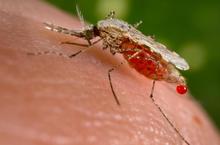A 2-year-old Gloucester County filly is the first reported case in 2015 of Eastern Equine Encephalitis (EEE), a serious, mosquito-borne illness in horses in New Jersey. The horse which had not been vaccinated against EEE was humanely euthanized on August 25, 2015.

Mosquito - Carrier of Eastern equine encephalitis
A 2-year-old Gloucester County filly is the first reported case in 2015 of Eastern Equine Encephalitis in New Jersey.
Eastern Equine Encephalitis (EEE) virus tends to occur in outbreak form. First identified in mosquitoes in Louisiana in 1951, the disease is transmitted to horses by mosquitoes that have fed on infected wild birds.
EEE virus attacks the central nervous system and unvaccinated horses are very susceptible to the infection. The disease appears within five days after a mosquito transmits the virus to the horse. Onset of clinical symptoms are abrupt and infected horses often die within three days.
The fatality rate is 90% or higher and an animal that survives the disease may have brain damage.
Symptoms
- Fever
- Sleepy appearance
- Muscle twitches in head, neck, shoulder and flanks
- Staggering gait
- Recumbency
Prevention
Annual vaccination of all horses and other equines is recommended. Horses vaccinated for the first time must receive an injection of EEE-WEE combined vaccine, followed by a second dose three to four weeks later.
The two-dose series is necessary to establish an effective immune response. If an outbreak occurs in the area, a second booster is advised.
Foals should be vaccinated at 4, 5, and 6 months of age for a total of three doses. Another booster should be given in six months and annually from then on.
In addition to making sure that all equines are vaccinated, horses should be taken in at times when the mosquito population is highest. This usually includes the hours around dawn and dusk. In some cases, horses can be blanketed or covered with protective gear to prevent bites. Insect repellant can be used on horses to prevent bites from mosquitoes.
In all cases, the population of mosquitoes should be controlled as much as possible by following the recommendations of mosquito-control personnel and the agencies in the area where horses are kept.
Any bodies of stagnant water should be drained and water-holding containers such as buckets, tires and other receptacles where water might accumulate should be emptied. Horse troughs and waterers should be flushed often to reduce mosquitoes near paddock areas.
Insecticides for treating mosquito nesting areas around homes and livestock premises should be used on a regular basis.
